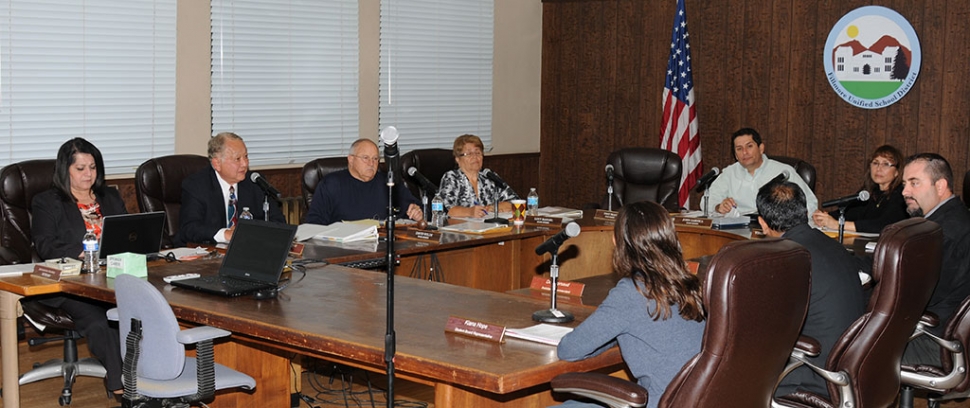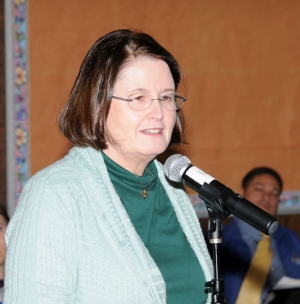|
School District Works to Be Ready for Common Core
 By Jean McLeod — Wednesday, November 20th, 2013
 Karen Ashim, Retired Fillmore High School Head Counselor, with 27 years of teaching, spoke of the problems associated with CCS and her desire to address them with the Board. This Tuesday's Fillmore Unified School District (FUSD) Board Meeting focused on the implementation of the Common Core Standards (CCS) that 45 states throughout the country must have up and working by 2014. The meeting had two presentations; A Three-Year Common Core State Standard Implementation Plan by Educational Service Staff and K-5 Common Core Curriculum Map Presentation by Carol Barringer. The approach the District is using to roll out CCS was started last year and is broken down into three stages: Awareness, Transition and Implementation. All the information and money needed to move to the Transition and Implementation stages has been slow in coming. One example is the State just approved the math framework November 6 and there is still a question of having the money for the technology needed. California is using a state-led consortium to generate assessments to measure student progress called The Smarter Balanced Assessment Consortium (SBAC) paid for by the U.S. Department of Education that will align with the CCS. Schools throughout the state are required to conform to the SBAC as schools move away from paper and pencil testing and begin taking tests online. Assistant Superintendent Michael Johnson explained that once a student answers a problem/question their answer will go directly to the State testing bank and be graded correct or incorrect immediately. This will require all schools have both the computers necessary for each student and the bandwidth to meet the increased demand such testing will require. The cost will be high for FUSD and those school districts without sufficient computer to meet student needs or the bandwidth. Superintendent Dr. Alan Nishino told the Board one way to save money is to considering using a computer lab with its own local server instead of using wireless applications. The District also needs to upgrade its software to Windows 7 to be compatible with CCS testing. There is also the need to teach young students how to use a computer in order to take the tests. Nishino asked a teacher attending the meeting how many of her 4th grade students had computers at home and was told many had computers, but only 50% had internet access. During Public Comments Karen Ashim, Retired Fillmore High School Head Counselor, with 27 years of teaching, spoke of the problems associated with CCS and her desire to address them with the Board. "On September 24th I requested, in writing, a specific math related item be placed on the School Board agenda. After seven weeks of hearing nothing about my request nor seeing it on the agenda, I contacted Mr. Michael Schwartz, Ventura County Assistant District Attorney. He contacted Dr. Nishino and informed the superintendent it was a violation of the Education Code to deny my request." She continued with questioning Fillmore students’ ability to advance to the next level in math due to not being properly prepared. "The student must have successfully completed the prerequisite before enrolling in the next level. Are Fillmore students prepared for the next level of math? The California Standards Test (CST) data says generally ‘No’. Ashim brought handouts with charts showing some improvements over the years, trying to make the point that having students start out at such a low achievement level to begin with and to then be considered ready to advance to a higher level would require a great deal more improvement. "My belief is that most students who score BASIC (represents a limited performance) are not prepared for the next level class." Ashim ended with suggesting offering other courses that will bring the 9th grade students up to the level required. When CCS was first presented schools and those involved in education were told the schools and teachers would present the curriculum and be involved in content. But critics today complain that CCS effectively eliminated the ability of parents and local school boards to influence content standards to suit local needs. There are many critics of CCS throughout the country with states like Virginia, Nebraska, Texas and Alaska not adopting its implementation at all. Those apposed say CCS was not approved by Congress, properly discussed or reviewed by the public, or given a vote by US citizens prior to approval and implementation and undermines the US Constitution's 10th Amendment authority of states over education. Some say it is a coordinated effort to standardize curriculum throughout the US and a leveling of all schools to one, low national standard with math standards that barely cover basic geometry or second-year algebra, with the classics are all but ignored in English classes. CCS emphasizes reading of short passages, rather than long fictional or historical narratives. Others question the collection of personal information required to take the tests with federal tracking of all students and that it is not the federal government's job to impose educational standards There are questions of government intrusion in terms of a politicized curriculum and partisan political statements in English lessons. This was reported by Fox New November 6, 2013. CCS teaching material which appeared in worksheets titled Hold the Flag High," asked 5th graders to edit these sentences; "(The president) makes sure the laws of the country are fair." "The wants of an individual are less important than the well-being of the nation." "the commands of government official must be obeyed by all." The worksheet was published by New Jersey-based Pearson Education. When pointed out the inaccuracies of those sentences the publisher agreed to modify the worksheet to clarify the questions. |
